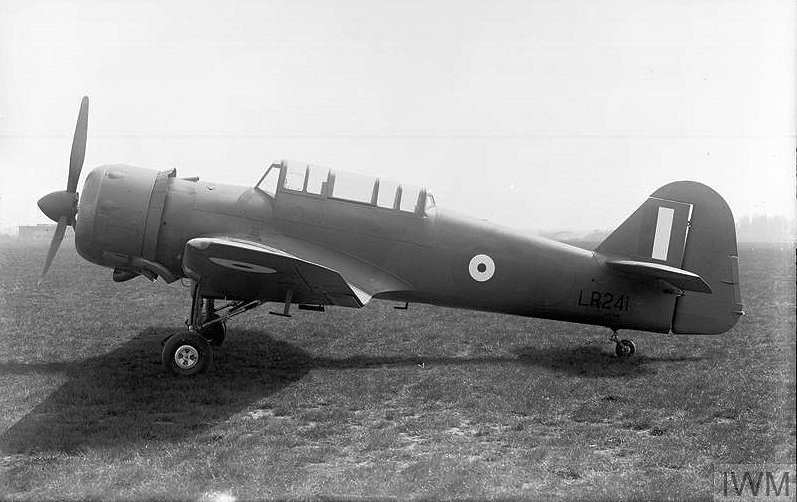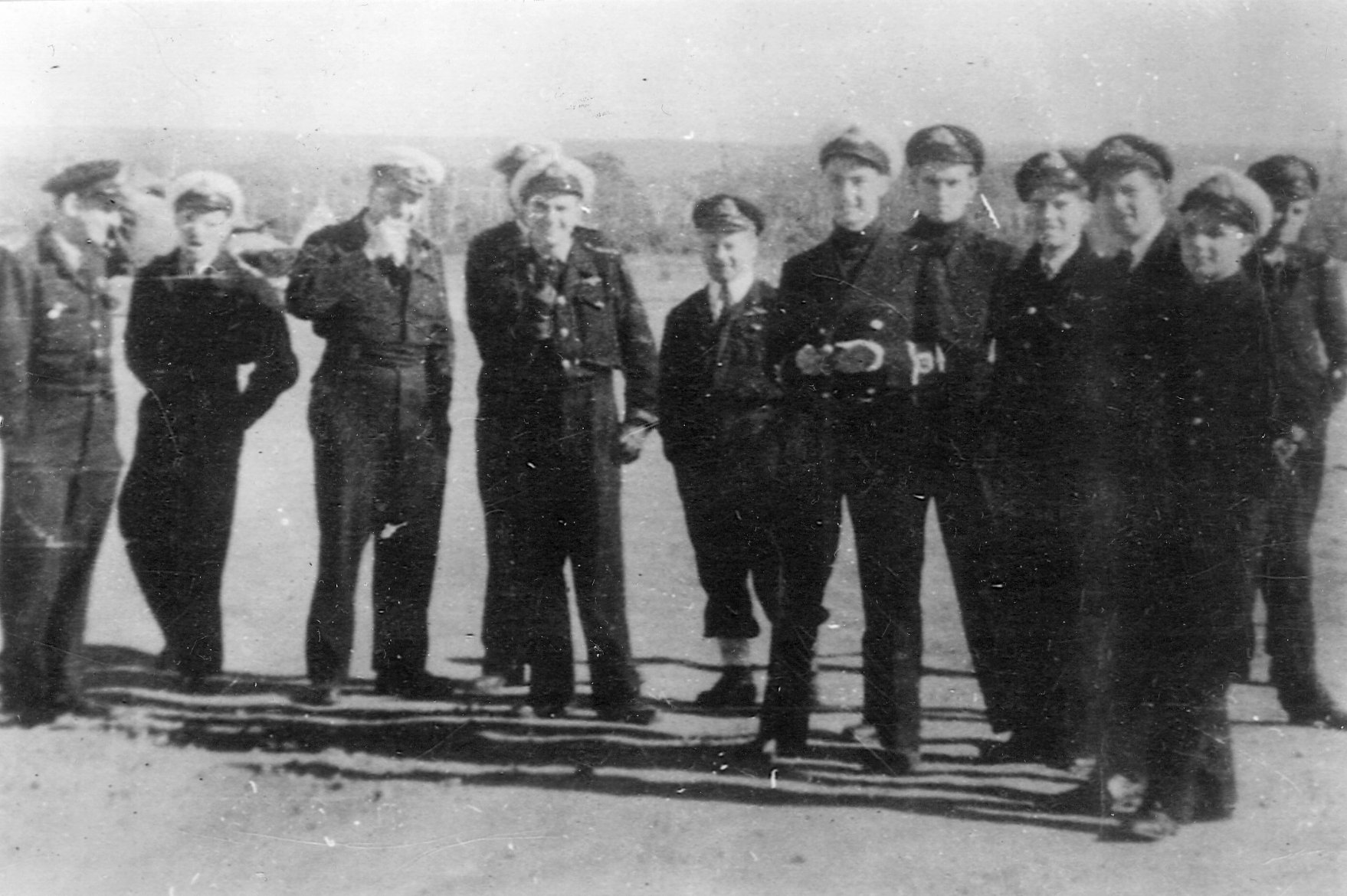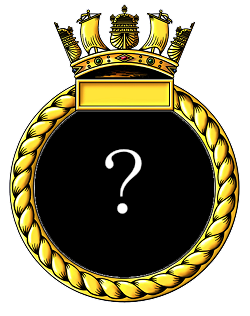



The core personnel of 723 Squadron assembled in the United Kingdom at Townhill Camp on November 21st 1944, and took passage for Australia on December 22nd on board the troopship R.M.S. Athlone Castle as part of an uplift of personnel including Mobile Naval Air Bases (MONAB) 2 and 3. On their arrival in Sydney on January 27th the squadron assembled at RNAS Nowra, New South Wales which had been opened as a Royal Naval Air Station by MONAB 1 on January 2nd 1945 as HMS NABBINGTON.
MONAB 2 had taken over RAAF Bankstown, Sydney on January 29th and commissioned as HMS NABBERLEY, once fully established as a Fleet Air Arm Receipt and Dispatch Unit the squadron personnel arrived on the station to officially form on February 28th as a Fleet Requirements Unit, Lt. Cdr (A) H. A. P. Bullivant RNVR in command.
Initial equipment issue was 8 Martinet TT.Is and 8 Corsairs; 2 Expeditor C.IIs were also on strength to establish communications flights in advance of the formation of 724 communications squadron which would begin operation in April. The squadron carried out a short workup period at RNAS Bankstown during March in preparation for beginning active duties, making flights to the RNAS Nowra and its satellite at Jervis Bay.

The MILES M.25 MARTINET Target Tug. In RN service aircraft was overall canary Yellow with black anti-glare on the upper engine cowling. image © IWM (ATP 10842C)
There were several flying incidents during this first months of operation, all involving Martinets; Prior to the official squadron formation Sub-Lt. D. Bogle RNVR damaged PX195 when his starboard wing dropped on landing on February 11t. On March 15th Sub-Lt. W. J. Bailey RNVR had to make a precautionary landing at Nowra in NR523, and Sub-Lt. D. Parrack RNVR landed PX197 without lowering the undercarriage on the 19th. Tragically two squadron personnel were killed on March 23rd when an unidentified Martinet on a test flight from RNAS Jervis Bay dove into the sea soon after take-off, the pilot Lt. C. R. T. Pemberton-Bartlett, RNVR and Air Mechanic D. W. Rutty were both killed.
The squadron was to operate from RNAS Nowra from May 1st but had to be accommodated at nearby RNAS Jervis Bay while the runways at Nowra were under repair, finally moving to RNAS Nowra on June 4th. Their primary tasks were to provide both towed drogue targets and ‘attacking aircraft’ for ship and aircraft gunnery practice, radar calibration and radar interception targets for ships and squadrons in the Sydney area. Twelve Beaufighter IIs were allocated to the squadron to replace the Corsairs in the ‘off shoot’ gunnery role and plans were made to include anti- jamming and radar training using two specially converted former RAAF Ansons but these had not appeared by the wars end but an RAAF Tiger Moth (A17-749) was added to the inventory in August.

The aircrew of 723 FRU at Nowra c.1945. identified officers are - Left to right, in front: Observer H. G. "Peanut" Huckle*; Pilot Ivan Sweeney*; C.O. Lt. H. A. P. Bullivant*; Pilot Charles Birch*; Lt. Jack Jones (stood back); Sub-Lt. Peter Hyde. Image courtesy Peter Hyde Additional names from Charles Birch. *=wearing battledress
In November 1945 the RN presence in the Pacific theatre was being scaled back, on November 15th HMS NABBINGTON (MONAB 1), was paid off and RNAS Nowra was recommissioned the same day as HMS NABSWICK by MONAB 5, RNAS Jervis Bay reverting to the status of a satellite airfield. 723 moved to RNAS Schofields, HMS NABSTOCK (MONAB 6) on January 21st 1946.
On February 11th Lt. (A) G. H. Horne, RNVR took over as commanding officer of the squadron. By the start of April 1946
HMS NABSTOCK at
RNAS Schofields was the only MONAB still in operation in Australia and it was now home to all of the second-line squadrons 702,
706,
723 and
724. These were all disbanded at
RNAS Schofields on May 31st.
HMS NABSTOCK and
MONAB VI paid off at Schofields on June 9th 1946 and the airfield was returned to RAAF custody.
Content revised: 23 October 2022
Additional sources:
Mobile Naval Air Base I - History of H.M.S. Nabbington
Mobile Naval Air Base II - History of H.M.S. Nabberley
Mobile Naval Air Base VI - History of H.M.S. Nabstock

None
Martinet TT.I Feb 1945 - May 1946
Corsair II Feb 1945 - May 1946
Anson I May 45 - \Jan 46
Tiger Moth II Aug 45 - ?
Lt. Cdr (A) H. A. P. Bullivant RNVR 28 Feb 1945
Lt. (A) G. H. Horne RNVR 11 Feb 1946
Squadron disbanded 31 May 1946
None
© 1999-2024 The Royal Navy Research Archive All Rights Reserved Terms of use Powered byW3.CSS
Press F5 to refresh the page after posting your comment or to hide the form
Watch the gun camera footage from his course Click here
Close
Comments (0)